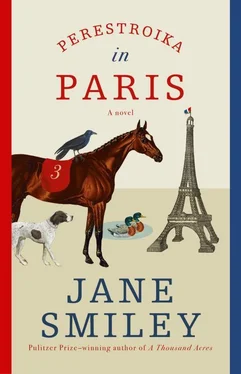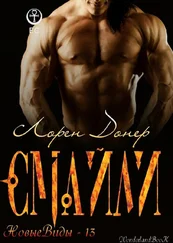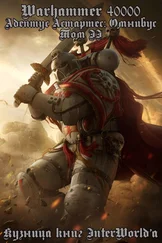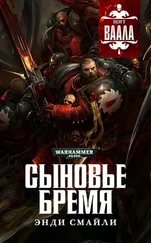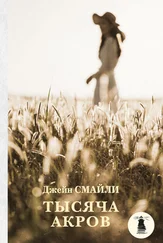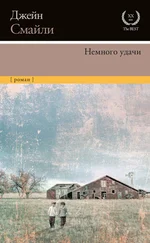When she got back to the pond, Frida had returned from the market. There were, of course, fragrant apples and pears, arugula, a few carrots, and an artichoke. Paras ate the artichoke first. It was a bit like taking medicine, but she enjoyed them—you couldn’t eat sweets all the time. Of course, Frida had also brought Nancy’s, and especially Sid’s, favorite item—blackberries.
It was Paras who noticed the boy.
There were occasionally boys in the Champ de Mars, and there were occasionally girls, but boys and girls were always attached to regular-sized humans. If she had ever in her life seen a solitary boy, Paras could not remember it. But now here was a boy. He was, in addition, staring at the five animals eating their treats, his feet wide apart, his hat pushed back on his head, and his hands in his pockets. As Paras watched, he took two steps toward them and stopped again.
Raoul finished his arugula and noticed the boy. He cawed several times, flew upward, and landed on Paras’s haunches. Frida said, “What are you talking about?,” because the wind was blowing in the wrong direction for her to scent him; then she saw the boy. Raoul said, “Chase him off.”
“Oh dear,” said Frida.
“What? What?” screamed Sid.
Paras knew that Sid was upset because the boy was not far from the building site of the new nest. Nancy kept her opinions to herself.
Frida said, “I saw this boy down the street from the market. I didn’t realize that he was behind me.”
“He followed you and you didn’t even notice?” cawed Raoul.
“The bag was very fragrant. I couldn’t smell anything else.”
“Chase him off,” cawed Raoul.
The boy held out his hand.
Now Raoul started walking around in small circles, cawing like mad. Twice he flapped his wings, but the boy didn’t understand the hint. He just stood there. Paras could see that Nancy and Sid were torn between eating the remaining blackberries and taking off. They kept watch on the boy and snatched a few. Frida sat. The boy took another step toward them. He was looking at Frida, but then he glanced at Paras. Frida suddenly stood up, and said to Paras, “Let’s go.” She took off, running away from the boy, toward the other side of the Tour, a less protected part of the Champ de Mars. Paras cantered after her. In a green area beyond the other pond, they stopped and looked back. Raoul had flown away; Nancy and Sid were nowhere to be seen. The boy was standing, staring down at their treats. He squatted and touched something, then stood up and walked away. In the grand panorama of the Champ de Mars, he looked very small.

PARAS HAD a dream. Perhaps it was the apples that gave her the dream, but she didn’t dream of apples—she dreamed of oats. She was standing in a summery green field with other horses, nibbling shoots of grass that grew among the yellow flowers. A gate opened, and a fellow came through, wearing a hat and carrying four buckets. He hooked the buckets to the fence, and Paras and the other horses went over and thrust their noses into the buckets and started munching on the oats. They were sweet and crunchy. When she woke up from the dream, it was early—not even the barest shimmers of light at the far end of the Champ de Mars. Frida was stretched out beside her. Paras rolled up onto her chest and then levered herself to her feet. Frida didn’t wake up.
If a curious filly wanted to walk down a street, her hooves clanging on the pavement, to look into windows without being seen by humans, then this was the time to do it, the only time when all was quiet. She crossed the field, glanced down one street, then turned down the next one. There may have been humans who awakened in their warm beds, looked at the dim windows, and said to themselves, “What is that noise?” They may have pulled the covers over their heads and decided they were dreaming, or they may have gotten up, looked out the window, and seen nothing. Possibly, it was that time of day when the security guards stationed here and there and a couple of members of the gendarmerie had the greatest difficulty staying awake, and so they didn’t watch the street as carefully as they might have. At any rate, Paras loitered and stared as she strolled along. Doors were closed, awnings were rolled up, windows were dark, the smell was mostly the damp pavement itself. She touched her nose to the cool metal of the automobiles, and the cool surface of the glass, and the stone buildings. She sniffed iron fencing, and nipped off tiny fugitive plants that grew through cracks in the pavement. She looked ahead, she looked back, she even looked up. A single dog was out and about, but he circled around her, his head low, his tail low, his ears low. He looked like a sad dog, not at all the proud beast that Frida was. There were cats here and there, squatting in corners, their paws tucked under their chests, their eyes slitted. They saw her—she knew this, because their heads turned as she passed. One, a black one, gave off a low meow as she walked by. Paras nickered in response. She might have seen a fox, too, slipping around a building, waving its orange brush, but foxes were elusive.
Then she saw a light in a window. She stopped and snorted. A figure within the light was busy staring at something, touching it, shaping it. Paras watched. The door was slightly open, and a strip of light fell onto the pavement. And a scent billowed out. Paras was drawn to the scent. She stepped closer.
Anaïs sensed that she was being watched. She glanced up and saw nothing but the darkness of the big windows that looked out onto the Avenue de Suffren. She had set her baking pans on the tables in the shop, and would carry them into the cuisine when they were ready. She shook off the feeling and went back to forming her rolls, her favorite part of baking. She had already baked the baguettes and the larger loaves. The croissants and petits pains au chocolat were in the ovens. Henri would arrive soon for the tartes and the galettes . But Anaïs was trying something—a roll with a hint of sweetness, cut into diamond shapes and dotted with fennel seed, then baked until the fennel seed turned crisp and golden. She heard a noise and looked up again. A horse’s head shone in the window, nostrils flared, ears pricked. Anaïs nearly jumped out of her skin. The two pans rattled as she bumped them. She exhaled, “Ahh!” The horse’s head turned to one side and then turned back, still staring. Anaïs coughed. Then she pulled herself together, wiped her hands on her apron, and went over to the coffeemaker. She picked up two lumps of sugar and went to the door, which she opened carefully.
The horse stood still for a moment, then approached her. It took one lump of sugar carefully off Anaïs’s palm, then the other one. The horse’s lips were velvet. Anaïs put her hand on the horse’s neck and stepped out into the street. The horse eased backward. Anaïs looked toward the École Militaire, and then she looked toward the Quai Branly. No one in sight. The horse’s neck was soft and warm, and Anaïs could not help stroking it under the heavy black mane, down and down. The horse dropped her head as if enjoying it. The air was cold. Anaïs shivered, stepped closer to the horse.
Anaïs didn’t have much experience with horses—she had ridden in a carriage twice and watched races on the television. About horses she knew only that they ate sugar and that they liked oats. Except that now she knew a third thing, that they had warm, fine coats. She stopped petting the horse and stepped back into the comfort of the bakery. In the corner, in a bin, Marie, who managed the café side, kept a supply of oats. Anaïs found a bowl and scooped some into it. When she went back outside, the horse had continued down the avenue. It was staring into a lighted shopwindow at bins of vegetables. Anaïs called out “Hello!” and made a kissing sound with her lips. When the horse turned its head, she rattled the oats in the bowl.
Читать дальше
